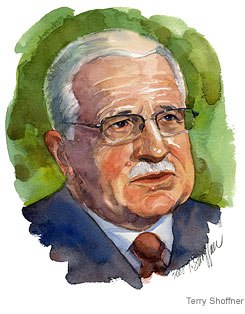I agree with the Karl Rove’s analysis below, that John McCain does not exhibit much understanding of Schumpeter’s process of creative destruction. On the other hand, I have seen no evidence that Barack Obama has any such understanding either. (Nor have I seen any evidence that Rove’s former boss, George W. Bush, has any such understanding, for that matter.)
And, in general, I am still of the belief that, overall, between the two of them, McCain will put fewer obstacles in the path of innovation than will Obama.
(p. A13) This past Thursday, Mr. McCain came close to advocating a form of industrial policy, saying, “I’m very angry, frankly, at the oil companies not only because of the obscene profits they’ve made, but their failure to invest in alternate energy.”
But oil and gas companies report that they have invested heavily in alternative energy. Out of the $46 billion spent researching alternative energy in North America from 2000 to 2005, $12 billion came from oil and gas companies, making the industry one of the nation’s largest backers of wind and solar power, biofuels, lithium-ion batteries and fuel-cell technology.
Such investments, however, are not as important as money spent on technologies that help find and extract more oil. Because oil companies invested in innovation and technology, they are now tapping reserves that were formerly thought to be unrecoverable. Maybe we are all better off when oil companies invest in what they know, not what they don’t.
And do we really want the government deciding how profits should be invested? If so, should Microsoft be forced to invest in Linux-based software or McDonald’s in weight-loss research?
Mr. McCain’s angry statement shows a lack of understanding of the insights of Joseph Schumpeter, the 20th century economist who explained that capitalism is inherently unstable because a “perennial gale of creative destruction” is brought on by entrepreneurs who create new goods, markets and processes. The entrepreneur is “the pivot on which everything turns,” Schumpeter argued, and “proceeds by competitively destroying old businesses.”
Most dramatic change comes from new businesses, not old ones. Buggy whip makers did not create the auto industry. Railroads didn’t create the airplane. Even when established industries help create new ones, old-line firms are often not as nimble as new ones. IBM helped give rise to personal computers, but didn’t see the importance of software and ceded that part of the business to young upstarts who founded Microsoft.
So why should Mr. McCain expect oil and gas companies to lead the way in developing alternative energy? As with past technological change, new enterprises will likely be the drivers of alternative energy innovation.
For the full story, see:
KARL ROVE. “Obama and McCain Spout Economic Nonsense.” The Wall Street Journal (Thurs., June 19, 2008): A13.
(Note: I thank John Pagin and Dagny Diamond for alerting me to Rove’s discussion of Schumpeter.)





